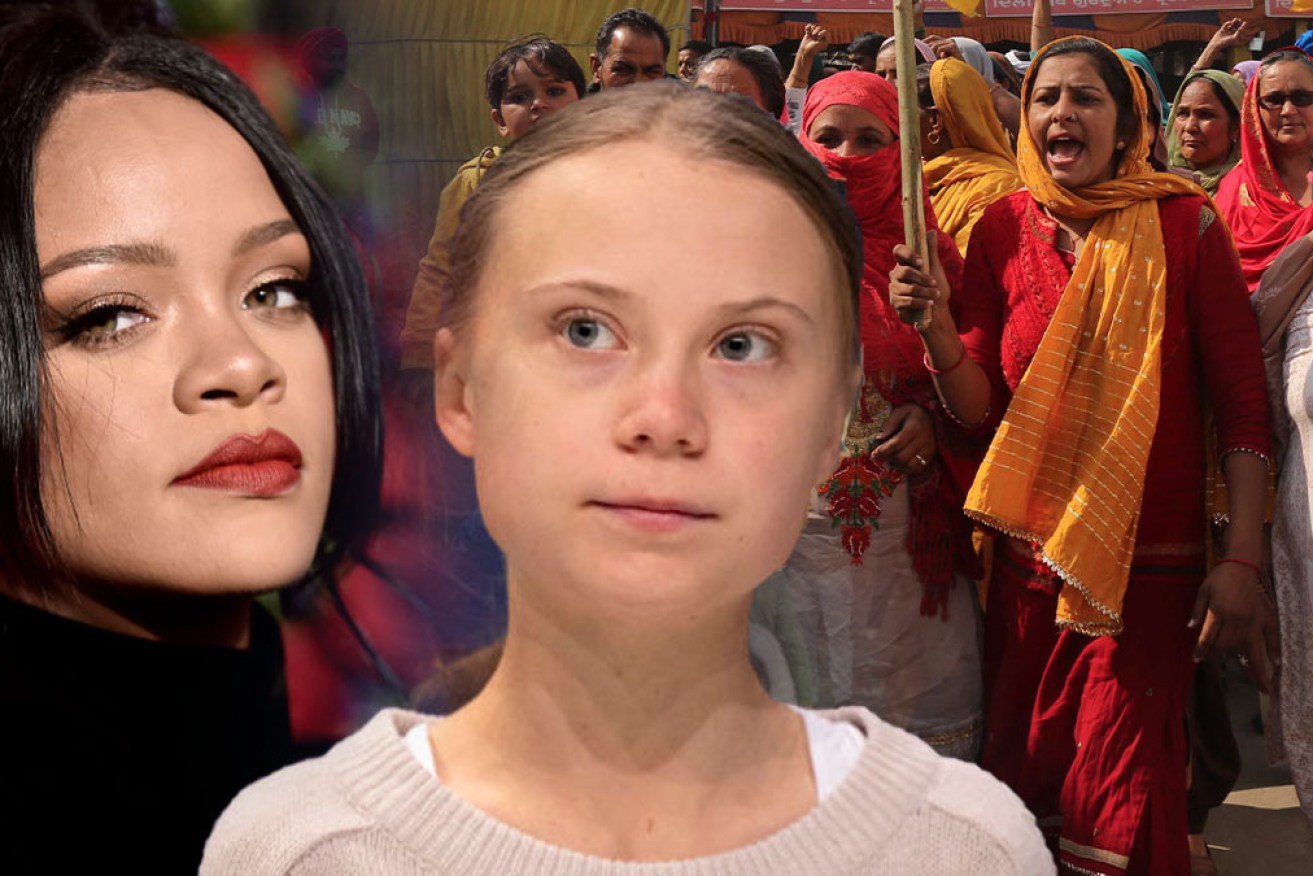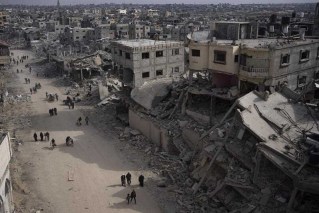Rihanna and Greta Thunberg join forces in crusade to ease plight of India’s farmers


Rihanna and Greta Thunberg have voiced their support for farmers fighting a controversial law in India. Photo: TND/Getty
The largest protest in human history is taking place in India – and it’s even drawn the attention of American pop star Rihanna and Swedish climate activist Greta Thunberg.
Protests, violence and death are shaking India to its core, as the government tries to bring in legislation that will scrap minimum produce prices for farmers.
Farmers – who make up 60 per cent of the country’s population – say these changes will rob them of any livelihood they have left.
On Wednesday, Rihanna tweeted “Why aren’t we talking about this?! #FarmersProtest” to more than 100 million Twitter followers, with a link to a news article about the demonstrations.

Rihanna has spoken up about a major farming crisis in India. Photo: Getty
Thunberg, 18, also took to Twitter, posting: “We stand in solidarity with the #FarmersProtest in India.”
Their supporters are pleased Rihanna and Thunberg are showing an interest in their cause, with one Twitter user writing: “Indian celebrities need to learn from you”.
I proud of you both……for supporting #FarmersProtest in india.@rihanna @GretaThunberg pic.twitter.com/3KVmwVppDN
— Krishna Sanjeet Jatav (@SanjeetJatavASP) February 3, 2021
But their advocacy has sparked fierce backlash from others on the ground, including former Test cricketer Pragyan Ojha.
“My country is proud of our farmers and knows how important they are, I trust it will be addressed soon,” he said on Twitter in response to Rihanna’s post.
“We don’t need an outsider poking her nose in our internal matters!”
Tweet from @sachin_rt
Meanwhile, the Indian government has stepped in, ordering Twitter to block content that alleges Prime Minister Narendra Modi is trying to “wipe out” protestors, ministry insiders have claimed.
Mr Modi’s government claims farmers will benefit from the changes and draw more investment.
Another crisis for India
The protests come as coronavirus cases continue to leap in the densely populated country, which trails the United States as the world’s second worst-hit nation.
We stand in solidarity with the #FarmersProtest in India.
https://t.co/tqvR0oHgo0— Greta Thunberg (@GretaThunberg) February 2, 2021
More than 154,600 Indians have now died from COVID-19, and at least 10 million have been infected.
For small and medium-scale farmers, however, the coronavirus is a secondary concern.
The #FarmersProtest is the largest protest in human history.
Watch to get a sense of its magnitude.pic.twitter.com/5psRALWtAk
— Simran Jeet Singh (@simran) February 2, 2021
For months, hundreds of thousands of farmers have been protesting in India, fearing the new laws will clear the way for big agribusiness corporations to take over and price ordinary producers out of the market.

Demonstrators have been sleeping on the roads at the New Delhi borders in freezing temperatures. Photo: Getty
Farmers have been fighting for years to get the minimum guaranteed prices increased.
The agricultural reforms have shone a light on the struggles of many Indian farmers, who were already finding it hard to make ends meet before the new laws were introduced.
At least 10,281 people involved in the farm sector ended their lives in 2019, accounting for 7.4 per cent of the total number of suicides in India, according to the Accidental Deaths and Suicides in India report 2019 by the National Crime Records Bureau.
Suicides committed by male workers far outnumber female workers, resulting in a growing number of women tending to farms on their own.
However, despite 85 per cent of rural women working in agriculture, only about 13 per cent own land.

Demonstrators protesting new farm laws at Singhu Border in New Delhi, India. Photo: Getty
Climate change has only made it worse.
Rising temperatures, drought and storms have destroyed crops and reduced farmers’ incomes even further.
Add to that economic pressures related to COVID and it’s a lethal mix of problems.
The tension is spilling into the streets, particularly in the state of Haryana, near New Delhi.
Indian farmers are leading the biggest protest in human history.
They are demanding dignity and justice in the face of increasingly harsh policies that favor corporations.
It's inspiring to see them protest with such vigor and resolve. #FarmersProtest pic.twitter.com/Z9Ludatpsb
— Simran Jeet Singh (@simran) February 2, 2021
In a controversial move that has concerned human rights groups, the Indian government has shut off internet connection in most districts in the state in a bid to quell violence between farmers and police.
The order was first imposed on Tuesday in only three Haryana districts, but has been extended every day since.
But Inderjot Kaur, a protester from the state of Punjab, told The New Daily the Indian government has gone a step further by disconnecting water and food supplies near the New Delhi border.
“These are basic human rights which are being snatched from the protesters,” she said.

Pop-up kitchens have been set up to feed protesters at the Singhu border. Photo: Inderjot Kaur
Fellow protester Manreet Khar, from the city of Chandigarh in Punjab, said the Indian government was “fortifying Delhi” to try to stop the protests.
“They’re building trenches, disrupting national highways and putting spikes in cement along the borders,” she said, adding it was “quite scary”.
A week earlier, on a national holiday known as Republic Day, thousands of protesters stormed New Delhi’s historic Red Fort – a popular tourist attraction – where police used tear gas and batons.
Dozens of police officers were injured and one protester reportedly died when a tractor flipped near Delhi police headquarters.








